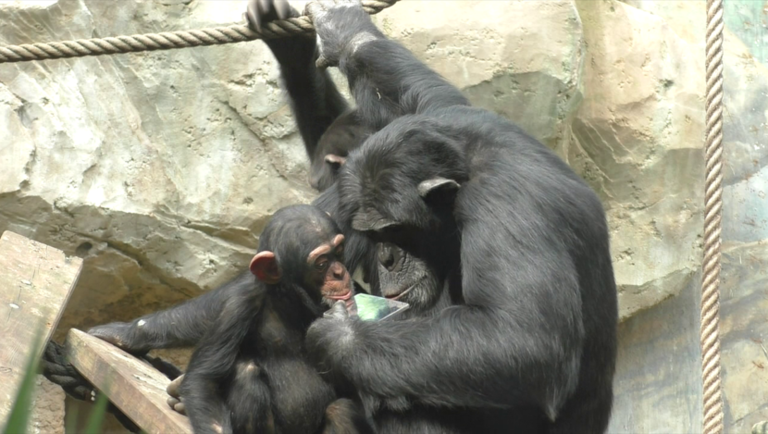Building on more than 20 years of successful collaboration with Zoo Leipzig the Department of Comparative Cultural Psychology at the Max Planck Institute for Evolutionary Anthropology (MPI-EVA) established a unique research network of scientifically managed European zoological gardens: the Great Ape Research Network (GrApeNet).
Collaboration on eye level
“Our objective is to build a sustainable cross-zoo cooperation structure that will allow us to jointly push innovation in the study of cognition and behaviour of non-human great apes,” says Daniel Haun, director of the Department of Comparative Cultural Psychology at MPI-EVA and initiator of the project. “Only by combining expertise across zoos and other research institutions can we tackle the big scientific questions about human and non-human thought.”
One of the department’s primary research directions is to explore the cognitive development in great apes from a comparative perspective. Here, long-term cross-zoo research provides a unique opportunity to systematically investigate factors that influence the development and variety of cognitive abilities and behaviours. Applying state-of-the-art methods to a large, diverse sample under social and relatively predictable conditions will deepen the researchers’ knowledge and complement the results of studies conducted in the wild. On the other hand, the research network ensures that the collaborating institutions can use the newest scientific insights to improve great ape care in zoos and sanctuaries.
14 European zoos have joined the initiative
“The response from zoos has exceeded our expectations,” says Kathrin Kopp, the research team member who leads the project. “So far, 14 zoos in Central Europe have already joined our growing research network.” Moreover, the leading association of scientifically managed zoological gardens in the German-speaking countries (Verband der Zoologischen Gärten e.V.) and the EAZA Great Ape TAG (Great Ape Taxon Advisory Group of the European Association of Zoos and Aquaria) support the GrApeNet research network.
“We are currently conducting the first comparative study on mirror self-recognition, including more than 200 orangutans, chimpanzees, gorillas, bonobos, and gibbons”, adds Haun. “Our initial experience with GrApeNet in running this study confirms our approach: collaboration on eye level is essential for successful research.”
###
In cooperation with Zoo Leipzig, MPI-EVA has been exploring great ape behaviour at the Wolfgang Köhler Primate Research Center (aka Pongoland) since 2001. Particular interest is directed toward the psychological development of the individual apes and the resulting differences and similarities between the species. The WKPRC works closely with animal keepers at Zoo Leipzig, on whose premises it is integrated. Four great ape species – bonobos, chimpanzees, gorillas, and orangutans – live in spacious indoor and outdoor enclosures that offer plenty of opportunities for activities. Zoo visitors can observe the primates in their enclosures and the adjacent study rooms.
[KK, DH/SJ]
Contact:
Prof. Dr. Daniel Haun
Max Planck Institute for Evolutionary Anthropology, Leipzig
+49 341 3550-400
haun@[>>> Please remove the text! <<<]eva.mpg.de
Dr. Kathrin Kopp
Max Planck Institute for Evolutionary Anthropology, Leipzig
+49 341 3550-614
kathrin_kopp@[>>> Please remove the text! <<<]eva.mpg.de
Sandra Jacob; Press Officer
Max Planck Institute for Evolutionary Anthropology, Leipzig
+49 341 3550-122
jacob@[>>> Please remove the text! <<<]eva.mpg.de
